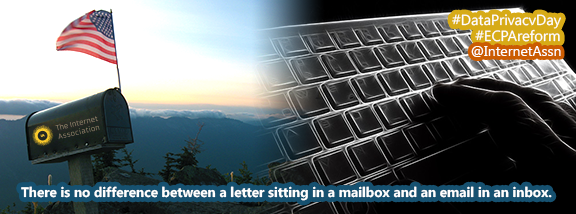
Did you know that a law written before email was commercially available governs the way the government can access your data online? Did you know that the search warrant protections afforded by the Fourth Amendment to the Constitution do not apply to the cyberspace for your data? Did you know that while law enforcement needs a search warrant to obtain a letter in your home study, it may in certain cases obtain the same letter stored on a web-based email server without a warrant?
Today marks the 5th year anniversary of the United States recognizing Data Privacy Day, an international effort used to raise awareness and educate online users about data privacy.
Currently, all law enforcement officers need to access your private data is a subpoena with no judicial oversight. For instance, if they want access to your emails or social media messages that are more than 6 months old, they can claim access without a search warrant. Compare that to law enforcement seeking access to your home mailbox. In this case, they would need a search warrant. In our digital age, why should there be a difference between an email and a printed letter?
Congress originally passed, the Electronic Communications Privacy Act ("ECPA") in the eighties to protect citizens' privacy in electronic communications for telephone calls, facsimile, and electronically stored data. Before email exchanges became a prevalent mode of communication commercially, many viewed emails kept for more than 6 months as inconsequential information that did not require a search warrant. However, changing times reveal that many Internet users choose to use web-based email as their personal lock box. Now, government may rely on lesser privacy standards to access your personal information in cyberspace that would otherwise require a search warrant in the physical world.
Recognizing this alarming fact, Patrick Leahy (D-VT), Chairman of the Senate Judiciary Committee, recently announced that one of his committee's "big-ticket" items for the year includes reform of ECPA. Notably, this is the very reason he chose to remain Chairman of this powerful committee.
Last Congress, Senator Leahy introduced an amendment to update ECPA to strengthen its privacy protections for Internet users. The amendment sought to eliminate ECPA's original 180-day rule, which permits government to access information stored in web-based email with merely a subpoena after more than a 6-month period. We commend Leahy's efforts to modernize ECPA and encourage policymakers to effectively govern the current and future technological environment.
The Internet Association supports ECPA reform. Our industry understands and supports law enforcement's important mission to maintain the safety of citizens but believes that they should obtain a warrant before gaining access to content albeit in cyberspace or physical-space. The Constitution does not end at the gateway to the Internet.

Tweet @InternetAssn your support for #ECPAreform and help us support #DataPrivacyDay.